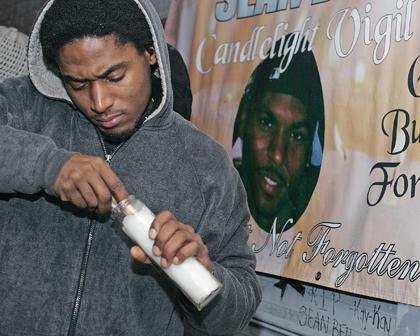By Ivan Pereira
Tuesday was supposed to be the second anniversary of Nicole−Paultre Bell’s marriage to Sean Bell, but she celebrated the rainy day mourning the death of her high school sweetheart outside the Jamaica nightclub where he spent the last hours of his life.
Paultre−Bell, Bell’s parents and dozens of mourners, including the Rev. Al Sharpton, took part in a special vigil outside on the corner of Liverpool Street and 94th Avenue where the 23−year−old father of two was shot 50 times by police just hours before he was to be married.
“It seems like it’s happening all over again. It’ll never change it still hurts,” Bell’s father, William Bell, told reporters.
For the entire night and morning, the mourners braved downpours as they prayed and reflected at the corner that was decorated with memorabilia of Bell and a candlelight memorial. The mourners looked back not only at the slaying but also at the numerous events triggered by the Rockaway resident’s shooting.
It was at that location on Nov. 25, 2006, where Bell and friends Joseph Guzman, 32, and Trent Benefield, 24, were confronted by five undercover officers who were conducting an investigation inside the Kalua Cabaret, the strip club on 93rd Avenue where Bell celebrated his bachelor party. When the officers showed up in an unmarked police minivan around 4 a.m., Bell rammed his Nissan Altima into the NYPD vehicle and the officers then fired 50 times at the sedan, killing Bell and wounding the other two.
The officers claimed they thought they heard Guzman say he was going to get a gun during an argument outside the club, but no weapon was found. Bell’s death galvanized the black community in southeast Queens and other parts of the city and led to several nonviolent protests against the NYPD.
In March 2007, three of the officers were indicted on manslaughter and reckless endangerment charges for the shooting. Detective Gescard Isnora had fired first and shot 11 times, Detective Michael Oliver fired 31 times and reloaded while Detective Marc Cooper fired four times.
Their criminal trial lasted nearly eight weeks over the winter and saw a Who’s Who of witnesses from club bouncers and strippers to forensic experts from across the country.
On April 25, Queens Supreme Court Justice Arthur Cooperman exonerated the officers, a decision that led to more peaceful protests around the city, including one where Bell’s family and friends and Sharpton stopped traffic at the foot of the Brooklyn Bridge.
Despite the outcome in Queens Criminal Court, the detectives and their comrades — Officer Michael Carey, who fired three times, and Detective Paul Headley, who shot once — are still not out of the clear. Last week Bell’s family met with federal prosecutors in Brooklyn to discuss the possibility of having the officers charged with civil rights violations.
All were named in a negligence lawsuit filed by Paultre−Bell, Guzman and Benefield in July 2007; that trial is pending the federal probe. The NYPD hit the officers with departmental charges in May, but like the lawsuit, that case is pending the actions of federal prosecutors.
Despite the ups and down, Paultre−Bell, studying pre−law at York College, has repeatedly said she is happy about the changes that have gone into effect since her financɒs death. The NYPD implemented a policy that requires officers who fire their weapons in the line of duty to take Breathalyzer tests and state lawmakers are pushing bills that aim to curb police brutality.
Reach reporter Ivan Pereira by e−mail at ipereira@timesledger.com or by phone at 718−229−0300, Ext. 146.


































